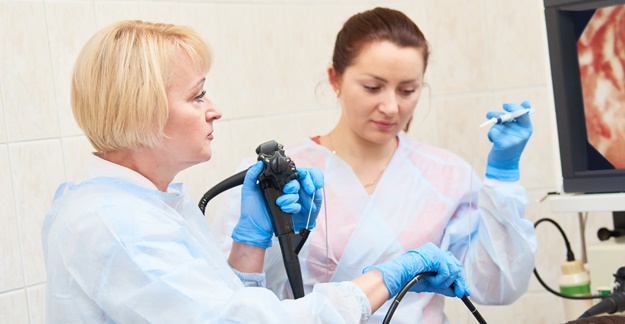Of all common medical procedures, colonoscopies stand out because of all the sitting that’s involved. Patients must chug a foul-tasting laxative drink as part of their prep and then spend hours on or near the toilet. It’s an awkward, disgusting and explosive experience.
So it’s no surprise that many people skip recommended colonoscopies. The good news: In many cases, patients can turn to alternatives that are also effective but much easier to tolerate.
“The most important thing is for patients and individuals to pursue screening,” said gastroenterologist Fola May, MD, PhD, of the University of California at Los Angeles. “The type of screening test is probably less important than we’ve been emphasizing.”
The stakes are high. “Colon cancer is the third most-common cancer. But it’s very preventable, and we can prevent most cases by screening,” May said.
Here are five alternatives to the traditional colonoscopy if you’re considering colon cancer screening because of your age or heightened risk.
1. The Stool Sample: Quick, Simple and Only a Bit Gross
The colonoscopy is the gold standard of colon cancer screening because it allows physicians to explore the intestines with a tiny camera and remove potentially dangerous polyps immediately. You even get to take home photos of the inside of your colon. (Hello, Instagram!)
But it’s also possible to detect colon cancer without an intestinal sightseeing tour. That’s because warning signs of cancer often appear in our feces. That’s where two types of stool tests come in.
The most common and most inexpensive is the once-a-year FIT (fecal immunochemical test).
“It’s appropriate for anyone eligible for screening except those with a strong family history of colorectal cancer, a personal history of cancer or precancerous polyps, or other high-risk conditions for colorectal conditions such as ulcerative colitis,” said gastroenterologist Chyke Doubeni, MD, of the University of Pennsylvania.
“People who have abdominal symptoms such as bleeding, feeling full easily or unexplained iron deficiency anemia or weight loss should talk to their doctor and undergo a colonoscopy, if appropriate,” he noted.
For this test, patients get a container that goes in the toilet and captures stool in mid-fall.
“You do need to look at your poop and scrape it with a scraper, but you don’t touch your poop at all,” UCLA’s May said. “You scrape a small amount of stool — less than the size of a green pea or a pencil eraser — and place it into a vial that you seal. You place that into an envelope that goes right into the mail.”
Voila! Poop by post.
The FIT is not a get-out-of-colonoscopy-free card. “Patients should be prepared to do a colonoscopy if it’s positive,” said gastroenterologist James Allison, MD, of the University of California at San Francisco. “Not doing the colonoscopy might mean that an early cancer could become advanced and incurable.”
Another stool sample option is the newer and widely advertised Cologuard test, which is taken once every three years. This test combines FIT and a DNA test.
However, “the evidence that it’s better than FIT is very limited, and it’s very expensive,” Allison said. “The reason it even gets sold is because it’s covered by Medicare. But patients will get a $400-$500 bill if it’s not covered.”
Also, the risk of false positives — a test result that inaccurately suggests a patient has cancer — is higher in this test, cautioned Theodore Levin, MD, a gastroenterologist with Kaiser Permanente Northern California.
2. Gentler Colonoscopies: You’ve Still Got to Prep
The traditional colonoscopy requires sedation, but there are two less common alternatives that don’t: The flexible sigmoidoscopy, which only examines part of the colon, and the virtual colonoscopy, which uses a scan instead of a hose. Both procedures, however, still require plenty of pre-procedure pooping.
“Flexible sigmoidoscopy is a shorter exam and is lower risk than a colonoscopy as there is no sedation involved,” said University of Minnesota gastroenterologist Aasma Shaukat, MD. The lack of sedation also means that patients don’t need someone to drive them home.
“It is a well-tested strategy for screening and has been shown to reduce the risk of developing and dying from colon cancer,” Shaukat said. “For patients not willing to undergo a colonoscopy, a flexible sigmoidoscopy is a great option.”
3. The Virtual Colonoscopy: The Short Option
Another option is the virtual colonoscopy, which doesn’t require sedation or, well, intestinal fortitude. “Some people are not happy to have a hose put in their rectum,” said UCSF’s Allison, and this test doesn’t require that.
In this test, physicians take a look at the colon via a CT scan. “It is a shorter test and safer than colonoscopy,” Shaukat said. “Availability is limited, but it’s a good screening option.”
4. The Capsule: Not a First-Line Option Yet
The “colon capsule” screening test “is an option for those who are interested in swallowing a camera,” said the University of Pennsylvania’s Doubeni.
For this procedure, patients swallow a pill-sized capsule equipped with a camera that takes photos of the digestive system. “There is a lot of interest in it, but so far the studies show it is not quite sensitive enough to be a primary screening test,” the University of Minnesota’s Shaukat said. “Currently, it is reserved for individuals who do not wish to undergo any of the other available options.”
5. The Blood Test: Lots of Limitations
It sounds like the perfect option: Avoid all toilet-based trauma by taking a blood test instead of a stool test or colonoscopy. “That would be wonderful,” UCSF’s Allison said.
Unfortunately, this option doesn’t yet exist. There is a blood test that detects a genetic sign of colon cancer known as methylated Septin9 DNA. But the test has a major limitation: It only tells you if you have colon cancer.
“This test doesn’t identify polyps, and it doesn’t identify early cancers that you can do something about,” Allison said. “It’s a last choice for someone who refuses a colonoscopy and refuses a FIT.”
Still, as Shaukat puts it, “the best screening test is the one that gets done.”
And just how effective are these alternatives compared to each other — and to a colonoscopy?
“We consider FIT and colonoscopy the best options,” UCLA’s May said. “Cologuard and virtual CT are below that. Cologuard is in the media a lot, but the data just aren’t there yet. It’s too early. [Few doctors do] flexible sigmoidoscopy because it only looks at half of the colon, and nobody sees the point of that. And the general feel is that the blood test is just not ready.”






